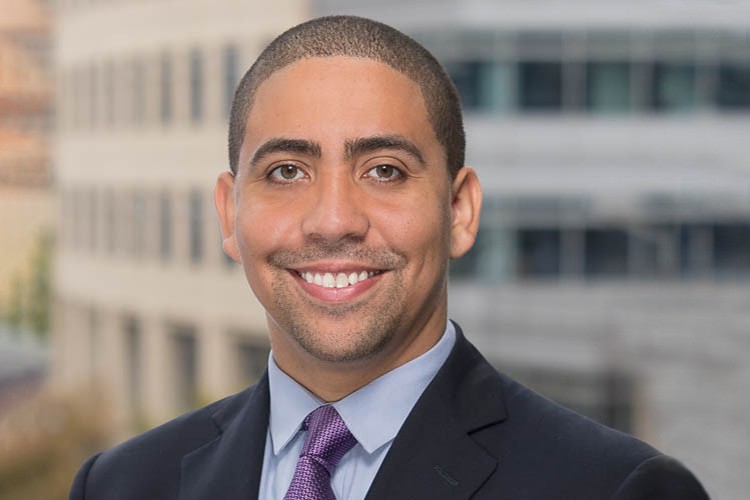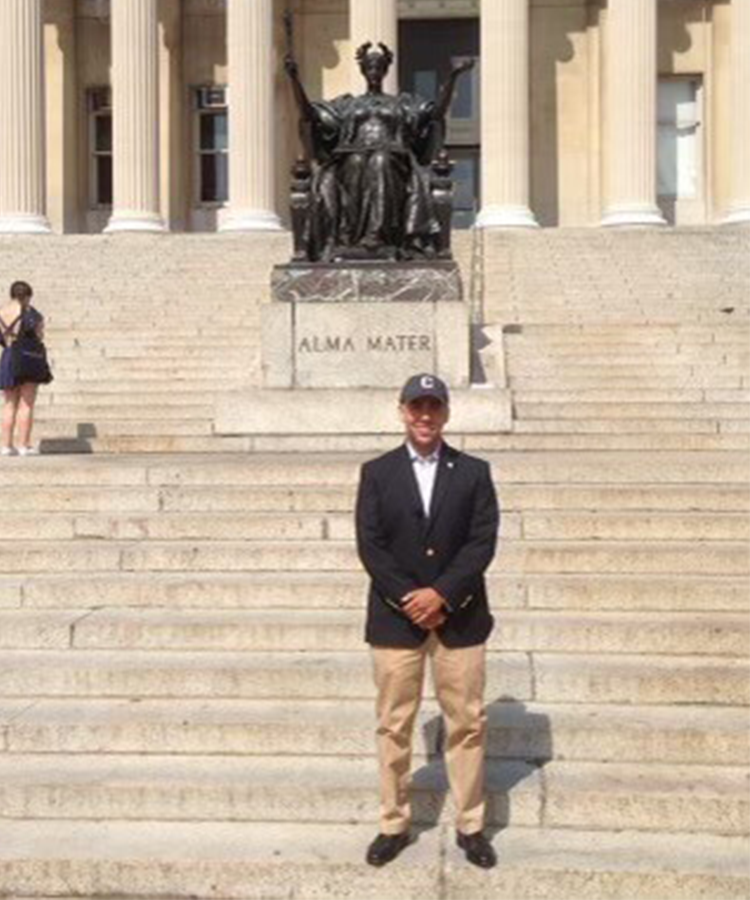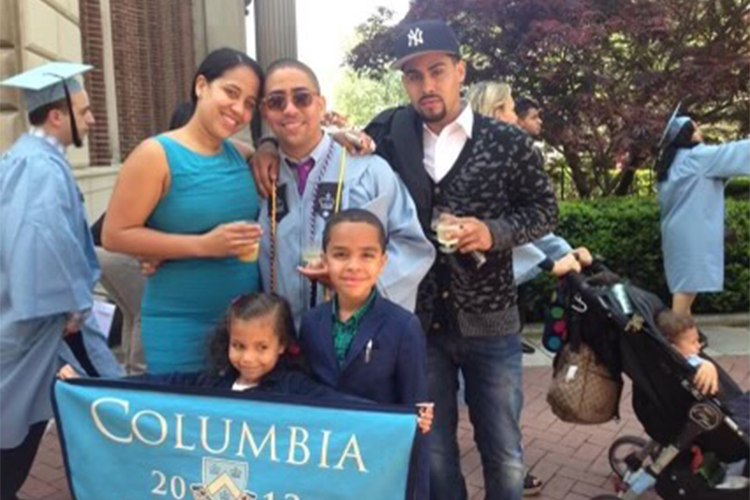‘I Lived Courageously:’ Veteran Marine Jacob Serra Grew Up in Harlem, Graduated Columbia
Jacob Serra (GS’13) joined the Marines after high school, but eventually found his way to Columbia, where he graduated Summa Cum Laude.

Jacob Serra (GS’13) grew up in Harlem on 135th St., between Broadway and Riverside Drive. As a kid, studying at Columbia University seemed like a long shot. After graduating high school, Serra joined the Marine Corps, which empowered him “to care for human life with integrity.”
When Serra left the Marines, he took time to readjust to civilian life before enrolling at the Borough of Manhattan Community College. There, he honed his writing and was encouraged to apply to Columbia to complete his studies. Not only was he accepted, but he graduated Summa Cum Laude in 2013 from the School of General Studies.
Today, Serra is a management consulting manager with Deloitte and proudly gave the commencement address at his high school, Edward A. Reynolds West High School, this year.
Columbia Neighbors recently sat down with Serra to learn more about his experiences in the community, as a veteran, and as a Columbia student.
Where did you grow up and what was your experience like? What was your relationship to Columbia?
I grew up in Harlem on 135th St. between Broadway and Riverside Drive. My dad used to walk us through College Walk to St. Luke’s Hospital when I was growing up. On one visit to the hospital, he said to me that I would never attend Columbia because the school was reserved for affluent kids.
I loved my dad, but I had to defy his thinking to attend Columbia. My dad was sentenced to 10 years in prison for conspiracy when I was 10 years old. My mom is a God-fearing woman and worked three jobs. She raised hard-working believers. I experienced poverty and violence on one hand and love and determination on the other.
Harlem instilled in me a lot of swag and confidence and so I knew that if I prepared, someday my chance would come.
When and why did you join the military?
I dropped out of high school to rent nice cars, party, and support my family. Luckily, I returned to school and graduated in three and a half years. Before graduation, I knew I had to make a decision: I could either follow in my father’s footsteps and succumb to the system I was born into or choose a different path for myself. I knew no one was going to sponsor my education and that opportunities weren’t fair and equitable.
At an early age, I noticed that people south of 125th Street looked different than me, went to different schools, lived in different places, ate at different restaurants, and had very different lives. I learned about segregation in school and lived it in the ways our communities were structured (whites primarily living in certain neighborhoods and people of color primarily living in others).
Nevertheless, I wanted to achieve success and create opportunities for myself, but didn’t feel prepared for college, nor did I want to take out student loans. It seemed like a bad investment since I wasn’t sure I’d succeed, so I enlisted in the military. It was a way out. I could feed myself, help my family financially, and leave the system I grew up in. Believe it or not, some people in the neighborhood wanted to kill me because I was changing my life, but the guys on my block protected me. I’m so grateful for them.

What was your experience in the Marine Corps?
The Marine Corps was challenging mentally and physically, but also emotionally because of the racism I experienced. At the same time, it was fun, intellectually stimulating and adventurous. I got to do things that I never imagined I would do and achieved things I never thought I could achieve. I did mission work in Israel, Kuwait, Saudi Arabia, Bahrain, Spain, Dubai, Iraq, Malta, and Sicily. I flew on helicopters, fast-roped out of them, experienced an emergency landing, and lived through combat.
I became a scout sniper, fast-tracked to sergeant, and got a medal for valor. Deployments were 80% good and 20% bad. I lost friends, I did things I never imagined I would need to do, and experienced international politics. I was also very empowered by doing the work I had to do with care for human life and integrity.
Additionally, the countries I visited, including Iraq, were beautiful despite the danger and realities of war. I enjoyed looking up at the sky and almost every night seeing a shooting star. It was special to be in such a sometimes compromising and dangerous position, and having a role in bringing back as many Americans, safely, as I could. I lived courageously, which is an important attribute to me and left a super positive impression on white men who had been taught to be racist. One of them called me their favorite brown person. He’s not racist anymore.
What was the transition from military to civilian life like?
Sometimes it feels like I winged my transition out, but I didn’t. I knew the military had taught me how to do a lot of damage and I took an EMT course before I got out because I was committed to doing more to help people. After I completed my service, I took some time off to reacclimate to society, did some traveling, lived in the Dominican Republic for a couple of months, and tried to communicate my experience.
I wasn’t successful in conveying my combat experience, but I felt a healthy sense of belonging when I was in the Dominican Republic, which I think I needed. I then ended up working as a contractor in Doha because I was broke and needed to do something before the Post-911 G.I. Bill kicked in to support my academic adventure. When I came back, no school would take me but Borough of Manhattan Community College. The professors believed in me and I bought into the school’s slogan of “Start Here. Go Anywhere.” It was an empowering, diverse, equitable, and inclusive environment. The faculty there are committed to making a difference and enriching lives – and they contributed to mine.
The professors and my community encouraged me to apply to Columbia. It seemed like a long shot, but everyone thought I could do it. While I studied at Columbia, I sold hot dogs, I took care of my family, and I graduated Summa Cum Laude. My community loved it. Everyone was rooting for me. It was special.

Any favorite spots on campus, in Harlem, or the surrounding community?
I love to eat French food, so Le Monde. I spent a lot of time at Butler (when students were returning from parties, I was going home from the library). I loved Low and connecting with the Dominican and diverse staff that works there. I also loved Avery, Kent, Hamilton, and Dodge. I also really enjoyed the Columbia graduate and undergraduate art shows. I participated in a few of them. Super special experience. I also loved the architecture around campus, including the Lions, which in Buddhism signify peace and prosperity.
What are you up to today?
I am a rising leader and management consulting manager at Deloitte and currently serve as the Future of Work Lead for state and local governments in the northeast. My expertise is the future of work, workforce transformation, change management, strategy, and data analytics.
I partner with government leaders to accomplish organizational transformations through workforce, workspace, and technology initiatives that create more flexible, innovative, and resilient organizations. I am committed to helping my clients modernize and improve government services so that people who rely on the same government services that I did have a better experience.
I also give motivational speeches at high schools and universities. This year, I delivered a commencement address for my high school where the total minority enrollment is 97%, 87% of students are economically disadvantaged, and the graduation rate is 10%. I’d love to deliver a commencement speech at Columbia someday. I’m also currently teaching a course at a historically Black college in DC through Deloitte’s Future of Work Institute. I spend the rest of my time with my wonderful wife, kids, and two dogs.
What do you think people misunderstand about veterans and the transition to civilian life?
I think they underestimate us and often miss how we can really be an asset to an organization versus a charity or diversity case. We have proven experience under pressure, protecting any organization’s biggest asset: their people. Some people also think we’re violent jarheads, but we’re much more than that. We’re fathers, CEOs, presidents, scholars, writers, Lions, and much more.
Anything else you want to add?
Put God first. Everyone is fighting their own battle. Be inclusive. Be fair. Be kind. I also have to quote Junot Diaz: “It’s never the changes we want that change everything.” This resonates with me because my life has been extreme and untraditional, but everything I’ve gone through has shaped me into the person I’m becoming.